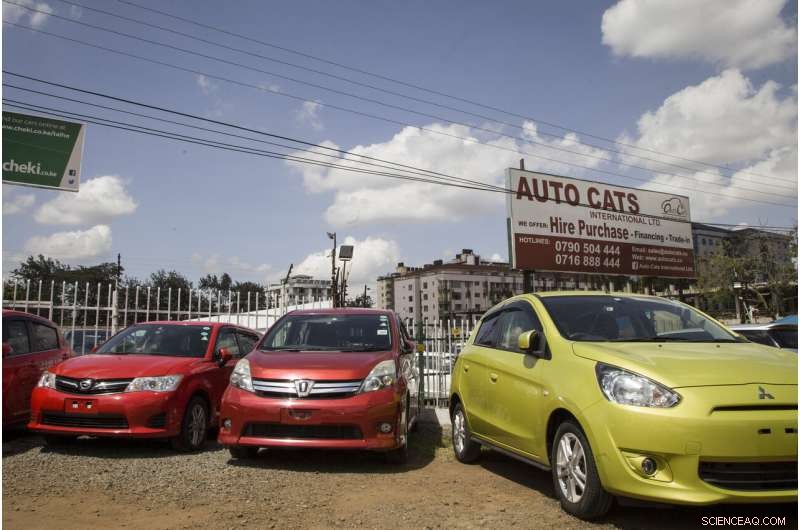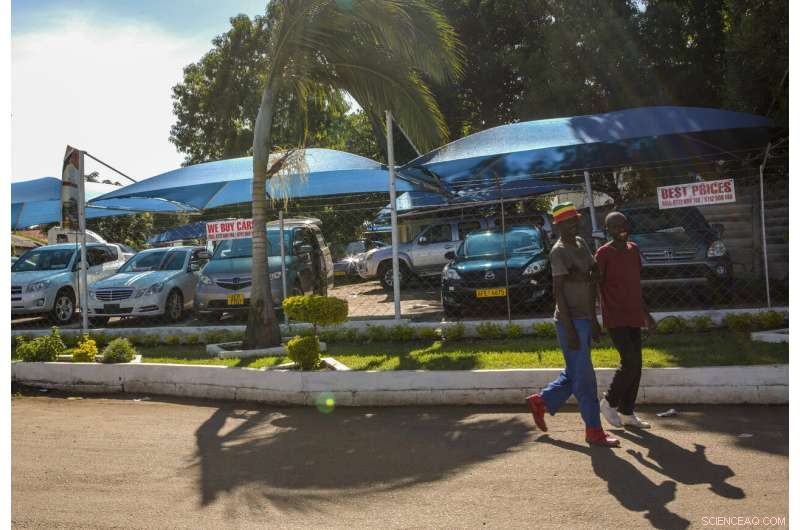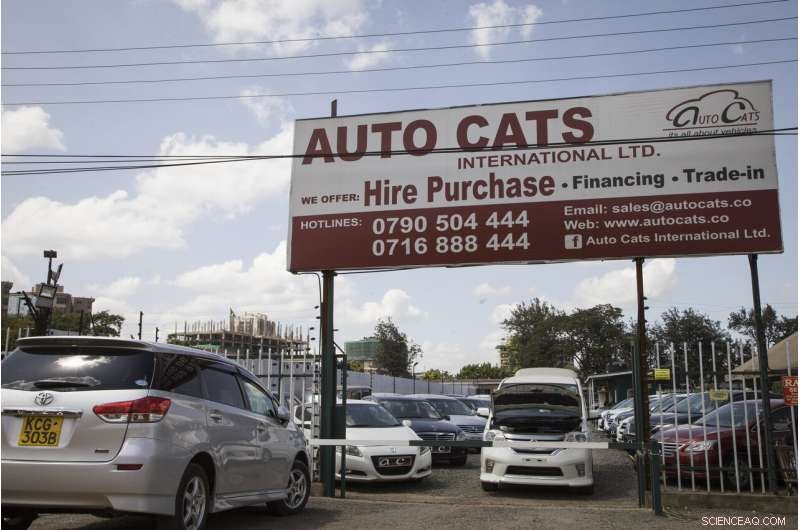Carros usados mantêm os africanos em movimento, mas as preocupações com o dumping permanecem
 p Nesta foto tirada terça-feira, 25 de fevereiro, 2020, um trabalhador lava carros usados à venda na capital Harare, Zimbábue. Em muitas partes da África Subsaariana, novas rodas geralmente significam um carro usado do Japão ou da Europa, que são acessíveis para a classe média em crescimento, mas ativistas ambientais e outros reclamam que os veículos usados, incapaz de atender a rigorosos testes de poluição em outros lugares, estão simplesmente sendo despejados no continente mais pobre do mundo. (AP Photo / Tsvangirayi Mukwazhi)
p Nesta foto tirada terça-feira, 25 de fevereiro, 2020, um trabalhador lava carros usados à venda na capital Harare, Zimbábue. Em muitas partes da África Subsaariana, novas rodas geralmente significam um carro usado do Japão ou da Europa, que são acessíveis para a classe média em crescimento, mas ativistas ambientais e outros reclamam que os veículos usados, incapaz de atender a rigorosos testes de poluição em outros lugares, estão simplesmente sendo despejados no continente mais pobre do mundo. (AP Photo / Tsvangirayi Mukwazhi)
p Os vendedores assobiam para os compradores em potencial de dezenas de veículos brilhando ao sol da tarde. Um caminhão pode trazer mais de $ 20, 000, mas está longe de ser o passeio "novo em folha" que o vendedor apregoa ao tentar ligar o motor. p O caminhão é um entre dezenas de milhares de veículos usados importados todos os anos para Uganda da Europa ou Ásia, especialmente no Japão. Em grande parte da África Subsaariana, as importações satisfazem a demanda por mobilidade, enquanto muitos sistemas de transporte público são rudimentares e os modelos mais novos não são acessíveis a muitos na crescente classe média.
p Mas os veículos usados são um problema, dizem funcionários. Eles contribuem com a carga de poluição em um continente que contribui muito menos do que outras regiões para as emissões que causam o aquecimento global.
p A África se tornou "o cemitério de veículos movidos a combustível fóssil, à medida que o Ocidente se volta para a eletricidade e tecnologias mais limpas, "disse Philip Jakpor, ativista da filial nigeriana do grupo Friends of the Earth.
p Acredita-se que muitos veículos usados enviados do Japão para a África tenham falhado, ou estavam prestes a falhar, testes de poluição lá, de acordo com o Programa Ambiental da ONU. Mas em muitas partes da África, esses regulamentos são frequentemente mal aplicados, e a corrupção desenfreada garante que os veículos usados possam escapar por quaisquer controles.
p O PNUMA, que chama a poluição do ar de "assassino silencioso" na África, responsável por cerca de 7 milhões de mortes a cada ano, alertou que as emissões dos veículos são a principal fonte de deterioração da qualidade do ar em cidades em expansão.
 p Nesta foto tirada quinta-feira, 13 de fevereiro, 2020, carros usados à venda estão estacionados no pátio em Nairobi, Quênia. Em muitas partes da África Subsaariana, novas rodas geralmente significam um carro usado do Japão ou da Europa, que são acessíveis para a classe média em crescimento, mas ativistas ambientais e outros reclamam que os veículos usados, incapaz de atender a rigorosos testes de poluição em outros lugares, estão simplesmente sendo despejados no continente mais pobre do mundo. (AP Photo / Sayyid Abdul Azim)
p Nesta foto tirada quinta-feira, 13 de fevereiro, 2020, carros usados à venda estão estacionados no pátio em Nairobi, Quênia. Em muitas partes da África Subsaariana, novas rodas geralmente significam um carro usado do Japão ou da Europa, que são acessíveis para a classe média em crescimento, mas ativistas ambientais e outros reclamam que os veículos usados, incapaz de atender a rigorosos testes de poluição em outros lugares, estão simplesmente sendo despejados no continente mais pobre do mundo. (AP Photo / Sayyid Abdul Azim)
p Mais de 1,2 milhão de veículos usados foram importados para a África em 2017, de acordo com os números da ONU. A maioria foi destinada à Nigéria e ao Quênia, duas das maiores economias da África. Ambos os países também possuem fábricas de montagem de automóveis.
p "O Ocidente se recusou a transferir tecnologia ou tornar a tecnologia de trânsito barata e acessível, "Jakpor disse." Nossos governos também falharam em investir em energias renováveis e transição, então teremos esse despejo por muito tempo. "
p Em Uganda, mais de 80% de todos os veículos são importações em segunda mão. Em parte para conter o fluxo, a legislação promulgada em 2018 proíbe a importação de veículos com mais de 15 anos e impõe impostos mais rígidos sobre os veículos com mais de nove anos.
p Um veículo usado feito em, dizer, 2010 pode parecer novo tanto para o comprador quanto para o vendedor no país da África Oriental, sem uma única montadora de automóveis e onde os veículos raquíticos são onipresentes. Não é incomum ver veículos emitindo uma névoa de fumaça escura. A polícia freqüentemente atribui acidentes mortais a veículos em condições perigosas.
p "Você não pode acordar e colocar uma proibição total" em veículos usados, disse Dicksons Kateshumbwa, Comissário de Uganda encarregado das receitas alfandegárias. “Há uma (classe) média de renda em crescimento. Todo mundo que consegue um emprego, e ganha dinheiro, quer dirigir. "
p Os impostos sobre veículos usados são "um componente-chave" das metas gerais de arrecadação da agência de receita, ele disse. Ele acrescentou que não há evidências sugerindo que impostos ambientais mais rígidos sobre carros usados diminuíram a demanda.
 p Nesta foto tirada quinta-feira, 13 de fevereiro, 2020, o tráfego fica na fila da rodovia Uhuru que leva ao centro de Nairóbi, Quênia. In many parts of sub-Saharan Africa new wheels often mean a used car from Japan or Europe which are affordable to the growing middle class, but environmental activists and others complain that the second-hand vehicles, unable to meet stringent pollution tests elsewhere, are simply being dumped in the world's poorest continent. (AP Photo/Sayyid Abdul Azim)
p Nesta foto tirada quinta-feira, 13 de fevereiro, 2020, o tráfego fica na fila da rodovia Uhuru que leva ao centro de Nairóbi, Quênia. In many parts of sub-Saharan Africa new wheels often mean a used car from Japan or Europe which are affordable to the growing middle class, but environmental activists and others complain that the second-hand vehicles, unable to meet stringent pollution tests elsewhere, are simply being dumped in the world's poorest continent. (AP Photo/Sayyid Abdul Azim)
p Car dealers in the Ugandan capital of Kampala told The Associated Press that demand for used vehicles remains solid because importers target certain vehicles that are much sought-after no matter how old they are. The Toyota RAV4 and Toyota Harrier are much-loved locally, por exemplo.
p "Ugandans are conversant with older models, so they are looking for those, " said car importer Amir Hussein of Cosmos Uganda Ltd. "For many people, it is their mindset:that old is solid, is good."
p Uganda's government last year contracted two companies to inspect used vehicles before they are shipped. The head of the standards agency acknowledges the system is imperfect as not all vehicles are subjected to tests as they cross into the country. Inspectors based in Uganda only carry out spot checks.
p Ben Manyindo, head of the Uganda National Bureau of Standards, called for a plan that eventually would lead to the banning of used vehicles from abroad.
p The question of whether to impose import restrictions remains contentious despite wide recognition of the dangers of an unlimited flow of used vehicles into Africa, the continent least equipped to deal with climate-changing carbon emissions.
p In Zimbabwe, where the government has tried and failed to impose restrictions amid resistance from importers and others, there is no age limit for imported cars. Used cars are not checked for emissions levels when they enter the southern African nation from ports in Tanzania, Namibia and South Africa, which notably allows the importation of used vehicles only for re-export to other countries.
 p In this photo taken Tuesday, Feb. 25, 2020, pedestrians walk past a shop selling used cars in the capital Harare, Zimbabwe. In many parts of sub-Saharan Africa new wheels often mean a used car from Japan or Europe which are affordable to the growing middle class, but environmental activists and others complain that the second-hand vehicles, unable to meet stringent pollution tests elsewhere, are simply being dumped in the world's poorest continent. (AP Photo/Tsvangirayi Mukwazhi)
p In this photo taken Tuesday, Feb. 25, 2020, pedestrians walk past a shop selling used cars in the capital Harare, Zimbabwe. In many parts of sub-Saharan Africa new wheels often mean a used car from Japan or Europe which are affordable to the growing middle class, but environmental activists and others complain that the second-hand vehicles, unable to meet stringent pollution tests elsewhere, are simply being dumped in the world's poorest continent. (AP Photo/Tsvangirayi Mukwazhi)
p Zimbabwe's environment protection agency lacks the resources to conduct effective spot checks for emissions, and over the years the government has appeared fickle in its attempts to regulate the trade in used vehicles.
p In 2010 the government banned the importation of vehicles older than five years but later backed down. In December the finance minister announced that older cars would pay less import duty than newer cars, sparking criticism from some lawmakers and environmentalists who argued the measure would encourage people to buy cars that are more harmful to the environment.
p "The old cars have higher emissions and are dumped on us because they are no longer considered as fit for the roads in their countries of origin, " said Byron Zamasiya of the Zimbabwe Environmental Law Association, which urges stricter controls. "We should be incentivizing people to import newer cars than older ones."
p Used cars from Japan are so common in Zimbabwe that the business may be one of the few still profitable in a country reeling from serious economic woes. Zimbabweans spent over $5 billion importing used cars between 2006 and 2016, and an average of 300 pass through Beitbridge, the main border crossing with South Africa, de acordo com dados oficiais.
p Open spaces in cities such as Zimbabwe's capital, Harare, have been taken over by used-car dealers selling anything from small sedans to rundown buses following the collapse of the country's once-vibrant car assembly industry. A usually unreliable public transport system also fuels demand for used vehicles among people who can still afford one.
p Like Uganda, Nigeria restricts importations of vehicles older than 15 years, but importers working with corrupt officials can always beat the system, according to importer Motola Adebayo. He believes the ability to bribe customs officials has encouraged an influx of very old vehicles into Africa's most populous country.
 p In this photo taken Thursday, Feb. 13, 2020, used cars for sale are parked in yard in Nairobi, Kenya. In many parts of sub-Saharan Africa new wheels often mean a used car from Japan or Europe which are affordable to the growing middle class, but environmental activists and others complain that the second-hand vehicles, unable to meet stringent pollution tests elsewhere, are simply being dumped in the world's poorest continent. (AP Photo/Sayyid Abdul Azim)
p In this photo taken Thursday, Feb. 13, 2020, used cars for sale are parked in yard in Nairobi, Kenya. In many parts of sub-Saharan Africa new wheels often mean a used car from Japan or Europe which are affordable to the growing middle class, but environmental activists and others complain that the second-hand vehicles, unable to meet stringent pollution tests elsewhere, are simply being dumped in the world's poorest continent. (AP Photo/Sayyid Abdul Azim)
p "Many of them are being used for commercial transportation, " he said of the imports. "Very old vehicles are now becoming the standard means of commercial transportation in Nigeria."
p Oke Ndubuisi, a taxi driver in Lagos, reasoned that "here in Nigeria, because people are paying very little as transport fares, you cannot easily recover the cost of your investment in a vehicle if it is an expensive one."
p The taxi he drives is one of many that contribute to air pollution in Nigeria's bustling commercial capital.
p "The prices of new vehicles will have to come down in order to address the problem of pollution caused by old vehicles, " ele disse. p © 2020 Associated Press. Todos os direitos reservados. Este material não pode ser publicado, transmissão, reescrito ou redistribuído sem permissão.




